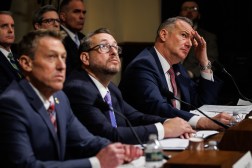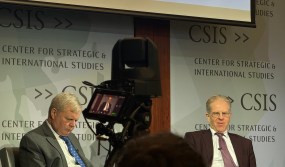FCC modernization not without challenges
The Federal Communications Commission is often touted as the golden agency for its massive IT overhaul efforts, but one FCC official said Thursday that work isn’t always painless.
“We’ve only been able to achieve 50 percent of what the goal was” for the agency’s IT modernization efforts, Summerlin said during a panel discussion at an event hosted by FedInsider in Washington, D.C.
He noted that percentage could change “if the Hill stops hating on us and we get some money.”
“Everything that we bring in, I have to cut something that gives me at least one-and-a-half times that money back. And it has to be immediately. So it’s kind of a hard pull for us,” he said.
John Skudlarek, the FCC’s deputy chief information officer, also has acknowledged the agency has been facing funding challenges.
“I won’t pretend that anything we’ve done is easy, and I won’t even pretend it’s cheap,” he said during an event at the National Press Club in July. “But I absolutely think it’s the right thing to do, and we aren’t going to put this genie back in the bottle.”
[Read more: Cost challenges remain in modernization efforts, officials say]
Summerlin said when he got to the FCC, the staff said there were “huge” problems with the IT. However, the FCC and its staff are relatively small compared to other agencies.
“The challenge of having legacy contracts and legacy systems — contractors who have been there for 20 years — is pretty insurmountable, unless you make everyone uncomfortable,” he said. “So the way you do that is you rip everything out that they know and you replace it with something, the cloud, that they don’t know anything about and can’t touch.”
Skudlarek also said change is disruptive and makes people uncomfortable. But making those changes requires buy-in from agency leadership, he noted in remarks at a demo day in June for Dcode42, an incubator to connect startups with government agencies.
“You have to produce stuff that works, but you have to have leadership to give you top cover to have some breathing room to let people settle in to the new way of doing things,” Skudlarek said at the time. “I’m not saying I want to give people garbage and make people figure out how to use it, but I am saying that you can innovate. But it has to be disruptive, and people are uncomfortable with that.”
[Read more: Agencies need leadership buy-in to innovate, officials say]
In addition to discussing modernization, Summerlin also talked about other issues the FCC is facing, such as around big data, which Summerlin said is caused by the need to combine databases.
“I have 1,800 databases — 1,700 employees, 1,800 databases is really dumb,” he said to laughter from the audience.
As an example, Summerlin described the state of the commission’s universal licensing system comprised of 26 individual apps, each of which he says has three separate databases.
He noted if a media company has 50 stations, to renew its licenses, it has to do it 50 times.
“A data structure that works is really hard for us,” he acknowledged.
And not only do those different databases create inefficient processes, Summerlin noted, but they burden the infrastructure.
But the FCC has made some progress, Summerlin noted.
“The FCC, which should be embarrassing to the rest of the government, has more cloud implementations than any other agency,” he said. “But that’s how serious we are about it.”
He said later: “My answer is if you’re coming to talk to me about anything that doesn’t reside in the cloud, don’t come. Because I’m not buying any on-prem anything ever again. Period. Full stop.”






